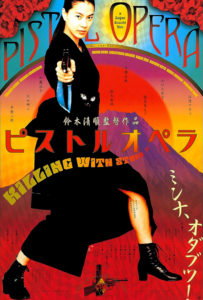Director: Seijun Suzuki
Cast: Makiko Esumi, Sayoko Yamaguchi, Kirin Kiki, Mikijiro Hira, Masatoshi Nagase, Kenji Sawada, Hanae Kan, Jan Woudstra, Haruko Kato, Kensaku Watanabe
Running Time: 112 min.
By Martin Sandison
Seijun Suzuki’s 1967 art-yakuza classic Branded to Kill has a hallowed place in movie history. It was deemed too experimental by Nikkatsu, who produced the picture and for whom Suzuki had made many low budget formulaic efforts previously, and he was promptly dismissed. It went on to influence generations of film-makers subsequently, most notably Quentin Tarantino and my favourite director John Woo. Branded to Kill was also my entrance into the Yakuza genre, as I caught it on the big screen back in 2006 in a Japanese cult film season that changed my life, alongside such greats as Sword of Doom and Hausu. Having revisited the film on Blu-ray it captivated me again, and now I have also revisited Suzuki’s own remake, Pistol Opera. One of his last efforts before he passed in 2017, the film is a distillation of Suzuki’s style, to the point that it’s like watching a recent Wes Anderson film: there’s much to admire, but the heart isn’t there as it used to be.
Pistol Opera takes the basic plot of Branded to Kill, that of a killer who is in competition with other assassins that operate as part of the mysterious guild. This time instead of Joe Shishido’s debonair yet eccentric Goro Hanada we have Makiko Esumi as the female protagonist Miyuki Minazuki. As others have noted, trying to outline what happens in the movie is near-impossible, without saying things get progressively more surreal as Makiko takes on the killers in set piece after set piece, and the structure is like that of a series of vignettes.
These mini-stories seem to have their own conclusions, in that Makiko is shot at the end of some, and survives others, only to appear in the next scene as if nothing has happened. However… the dialogue makes reference to what has happened previously, meaning there is some kind of internal logic in place. At the time Suzuki hadn’t made a film in 8 years, and it’s like he wanted to cram every idea he had into the almost 2 hour runtime. The film is like a fever dream, and can be distilled to this, in my head: an art installation crossed with a motion picture. All of the aspects of film-making that Suzuki has at his disposal work together to achieve this, and it’s admirable that he attempted and pulled off the feat of trying something so different.
Visual treats like an apparent after-life framed by a golden-lighted river, a gunfight taking place in a forest with a background of yellow paint smog, the pop art credit sequence that is oh-so 60s and the increasingly phantasmagorical ending convey a wonderful cinematic mind at play. The problem that starts early in the film is that in between these nuggets are standardly shot monologues or strange uninteresting scenes that had me drifting off into my thoughts. It’s a real shame, because when the good bits start, they are completely immersive.
The surrealism at play in Pistol Opera is innately Japanese, with scenes staged like a Kabuki play, an ancient art form that concentrates on the bizarre featuring fantastical costumes. This is combined with modern dance, pop art, a jazz and reggae soundtrack and an artistic approach to visuals. Elements like revolving doors featuring characters, with paintings on other sides, hanging doll-like mannequins and cherry blossoms being shot at reminded me of modern art exhibitions I’ve attended. Albeit these didn’t include stylised gunfights.
Those expecting action in the John Woo mould may be disappointed. The sequences are impressions of violence, in a theatrical sense. No blood is spilled, and there is a healthy dose of the absurd at play. In one scene Makiko gets another killer to impale his own heart with a dagger, which is obviously a toy with a retractable blade. I did find these scenes intriguing and at times powerful, despite being an action junkie at heart.
I’ve seen a handful of Suzuki’s flicks throughout the years, and the one that stood out the most is Tokyo Drifter. A wild blend of 60s pop art and a more commercial style, it’s a fun ride. Pistol Opera and its source material Branded to Kill require patience and an inclination for more highbrow cinema. Despite this, and having a love for arthouse films, I still found sections of both films boring. It’s worth the deep dive, though.
Martin Sandison’s Rating: 6.5/10





Great review Martin, you have me curious to check this one out! Ironically I only recently got through finishing off Suzuki’s Taisho Trilogy – 1980’s ‘Zigeunerweisen’, 1981’s ‘Kageroza’, and 1991’s ‘Yumeji’ – the last of which was the only feature length production he’d make in the 90’s before returning with ‘Pistol Opera’. They reminded me of how much I love his work, and your review reminds that there’s still plenty of if that I’ve yet to see!
Thanks Paul! I actually watched and reviewed Ziguenweisen a few years ago, and never got around to watching the other two, though I really liked it. I must see his final film Princess Racoon too.